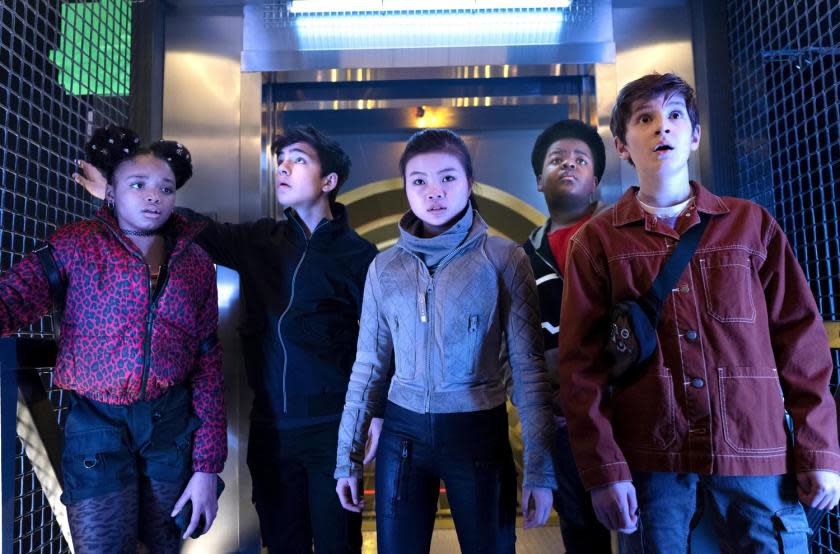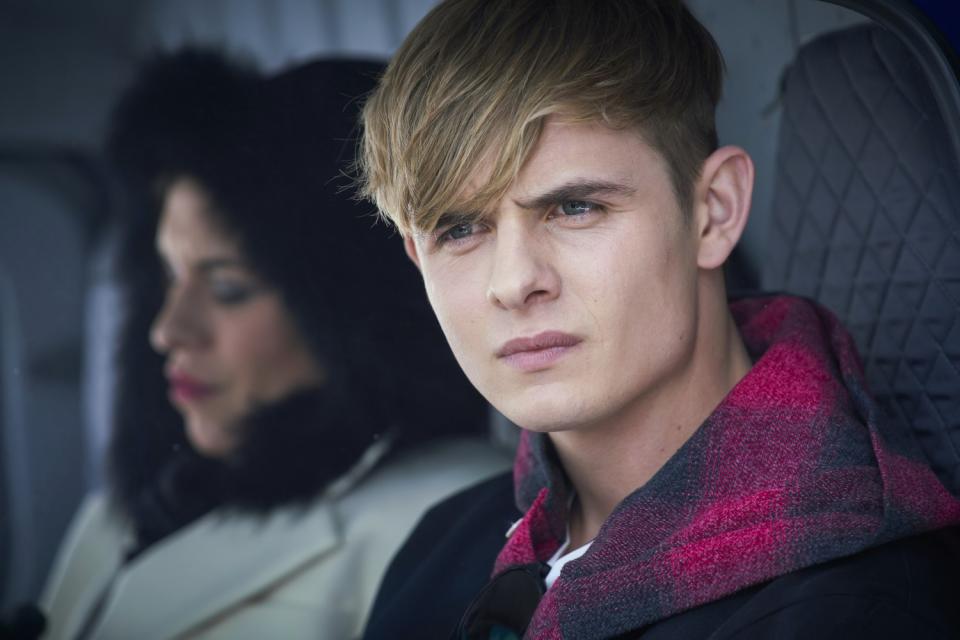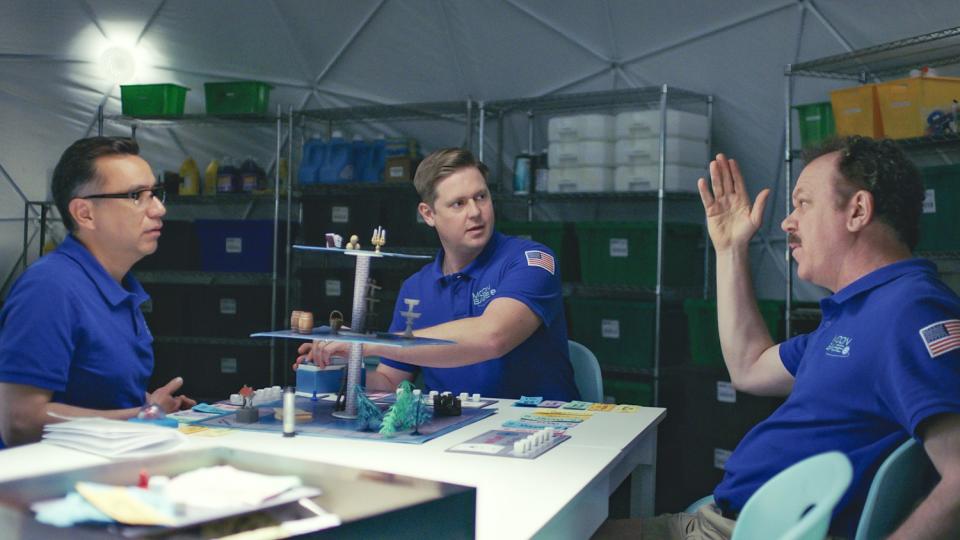3 new TV shows to watch this weekend if you're hankering for an adventure

Adventure comes in many forms. Three new series — the teenage spy drama "Alex Rider," the teenage space drama "The Astronauts," and the middle-aged space-training comedy "Moonbase 8" — offer disparate examples. None is particularly plausible, but none is dumb, either. All are very good, in fact: well-made, well-played. The kid shows are genuinely tense and exciting; the grown-up comedy, unexpectedly touching and sweet.
"Alex Rider," a presentation of IMDb TV (the much-employed internet movie database), streaming by way of Amazon Prime, screams "teenage James Bond" from tip to toe. Indeed, Anthony Horowitz, on whose books the series is based, is also the author of the latest two post-Ian Fleming Bond novels; he has a twin history in young adult literature and mystery writing, he is the creator of "Foyle's War," wrote many early episodes of "Midsomer Murders" and wrote the screenplay for a 2006 film adaptation of the firstAlex Rider novel, "Stormbreaker." Fourteen years later, the second book, "Point Blanc," with the origin story flown in, gets its miniseries adaptation.
Alex (Otto Farrant), when we meet him, is a simple London teenager, living with his uncle Ian (Andrew Buchan) and American assistant-cum-housekeeper Jack Starbright (Ronke Adekoluejo); he is a little sensitive, a little serious, a little shy — the kind of character who likes a girl who doesn't know his name and only sort of remembers they have a class together. He has a classically appointed, nerdy-arty chatterbox best friend, Tom (Brenock O'Connor), who sports a lapel full of buttons and pins like it were 1979, and is the person I would follow if this were a "Choose Your Own Adventure" tale. But that's just me.
When Uncle Ian turns up dead, it turns out he wasn't a banker at all but a spy. This and that and this and that happen, and Alex, who by now has himself displayed the skills, brains and nerve of a top-flight secret agent, finds himself an unwilling recruit to the same nameless branch of British intelligence for which his uncle worked — just the fellow they need to infiltrate a posh school for the troubled children of billionaires where murky deviltry is afoot. In a snowbound pile nearly as huge and empty as the Overlook Hotel, Alex will meet a bloviating villain who has kind words for Mao, Stalin and "the Fuhrer" and notes "if your message is strong enough you can take away people's liberties, and they will applaud you for it." Hmmm.

As adapted by Guy Burt, it is too long — unless you think that what the world has always needed was, say, an eight-hour cut of "Dr. No" — mostly in that it takes Alex away for lengthy stretches from Jack and Tom, his actual, attractively played support system, and puts too much space between the well-staged action scenes. (Especially memorable are one in which Alex tracks a car through London by bicycle and a mountainside chase involving snowmobiles and an improvised snowboard.) It drags a little in the middle. At the same time, I appreciate the naturalistic, dark approach to the filmmaking — "Alex Rider" is more "Smiley's People" than it is "Live and Let Die" — that balances the plot's more outrageous contrivances.
In Nickelodeon's "Astronauts," which has Ron "Apollo 13" Howard as an executive producer and premieres tonight with back-to-back episodes, five middle-schoolers sneak aboard a rocket ship only to find themselves blasted into space from the combined effects of youthful curiosity, the desire for selfies (it is powerful), an unbelievably porous security system, general adult inattention and some yet-to-be-understood hacking of the spacecraft's AI, named Matilda (Paige Howard).
Created by Daniel Knauf ("Carnivàle," "The Blacklist"), it must surely be the most expensive Nickelodeon series ever, with special effects so special, and so omnipresent, you don't notice them at all. Apart from the production, and the framing and pacing of Dean Israelite's direction, what most sells the show is Miya Cech (13, playing 11) as Samy, the level-headed, super-smart one — she skipped "two grades" — whose mother was supposed to command the mission. Cech's expressions of concern and delight and cool expertise are never oversold and always convincing, and within the unreal reality of the show, we have no trouble believing Samy capable of flying a spaceship she has never so much as stepped inside. (Years messing around with her mother's flight simulator notwithstanding.)
Her accidental crewmates represent a range of types. Some are kind of annoying, which is a testament to the performances in a way, and I assume — hope — they will be allowed to grow more complex and subtle and likable in the infinite expanse of space. Elliot (Bryce Gheisar) is the son of the project's Elon Musk stand-in, a bit pushy but insecure deep down. Siblings Martin (Keith L. Williams) and Doria (Kayden Grace Swan) have a father in mission control; he's dry and ironic, she's into her phone. Will (Ben Daon), whose mother is an adversarial reporter, holds down the hyperactive goofball roll; he's like Shaggy on four cups of coffee.("Are there helmets? Do we get to put on helmets?")
It's common in YA stories for children to be granted day-saving agency, while the grown-ups run around being of no help at all. The target audience is, of course, already liable to suspect that adults are the actual cause of any bad situation as well as the main obstacle to righting it. Still, Samy aside, the accidental crew of the Good Ship Spaceship will have screaming and panicking to work through on their way to getting it together to not die in space. (The panicking is successfully tension-inducing.)
One wonders what sort of adventures, beyond fixing things that go wrong around their extraterrestrial motorhome, they will have. (The original mission was to rendezvous with a strangely behaving space object.) Will they meet space pirates or ethereal aliens? Will they grow old in a white room, then turn into floating space babies? Will they acquire a new crew member to even out the girl-boy ratio? I have seen only the first two episodes, and I expect much to be revealed before we get a second season — which I also expect.

"Moonbase 8," on Showtime, is the collaborative work of Fred Armisen, Tim Heidecker, John C. Reilly and Jonathan Krisel. All write. The first three star; the fourth directs.
They have history. Krisel worked with Heidecker in various capacities on "Tom Goes to the Mayor," "Tim and Eric Awesome Show, Great Job!" and on the Reilly-starring spinoff "Check It Out! With Dr. Steve Brule" and was a writer and director on Armisen's "Portlandia," Armisen has been a frequent guest on Heidecker's "Office Hours" podcast and appeared on "Awesome Show," and I don't know what else. They're friends.
"Moonbase 8" finds them living together in a "simulation base" in the Arizona desert, practicing to live on the moon; practically speaking this means they wear spacesuits when they leave their pod and eat canned bagels and "beef-style stew." One might reasonably wonder what sort of space agency would take three middle-aged men with questionable qualifications and saddle them for hundreds of days with meaningless tasks — planting a seed in a pot; taste-testing a candy bar for Mars, the candy company, and to make up a NASA budget shortfall — while younger fourth teammates come and go. There might be an answer to that question, but it is not explored this season. (The final shot seems to hint at a larger context, but it might just be a punchline.) It is profitable coincidence that this series about community in isolation, first announced in 2018, has arrived in this time of COVID-19. (Treating the environment as lunar, the characters wear protective gear to go outside; there is even a quarantine-themed episode.)
As in a jazz trio, each actor brings his own voice to the mix. Heidecker, attempting to say grace, has the stumbling cadence fans will recognize from "On Cinema at the Cinema" and "Decker": "We honor and pray for you, we don't pray for you we pray to you …. Blessings on the coffee, blessings on this delicious sweet potato soup that is almost too spicy for me, not in a hot way, it's almost Middle Eastern, Moroccan." Armisen, in his deadpan singsong, offers ridiculous theories as to who's been prowling around their base. "Could be artists looking for materials, could be trick-or-treaters, could be just circus people who lost their way or something." Words spill from Reilly like animals escaping from a pen.
It is old-fashioned in some respects — "Gilligan's Island" in the desert but with psychology and emotions, or a sad "Three Stooges." Each of them is carrying a weight: Armisen's Skip, an engineer, seems the most capable but labors under the shadow of his father, a legendary NASA figure; Heidecker's Rook, encouraged by his pastor to spread the gospel "out into the universe," has begun to suspect there was an ulterior motive behind this suggestion, and that it is one his wife shares; and Reilly's Cap, nominally in charge of the unit, has had his life fall apart. ("We've all had a helicopter tour business go belly up overnight because we didn't pay our taxes.") "If I go up to the moon," he says, "I'm not a deadbeat dad. I get up to the moon, I'm a hero."
They will sometimes drive one another crazy and often humiliate themselves, but in their own way they get the better of, or at least survive, most situations. Though they might be failing in some worldly sense of success, they are succeeding within the bounds of their base, and one suspects they are better off in this desert out of Beckett than they would be anywhere else. It is a kind of love story, finally.
This story originally appeared in Los Angeles Times.


